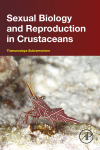

Most ebook files are in PDF format, so you can easily read them using various software such as Foxit Reader or directly on the Google Chrome browser.
Some ebook files are released by publishers in other formats such as .awz, .mobi, .epub, .fb2, etc. You may need to install specific software to read these formats on mobile/PC, such as Calibre.
Please read the tutorial at this link: https://ebookbell.com/faq
We offer FREE conversion to the popular formats you request; however, this may take some time. Therefore, right after payment, please email us, and we will try to provide the service as quickly as possible.
For some exceptional file formats or broken links (if any), please refrain from opening any disputes. Instead, email us first, and we will try to assist within a maximum of 6 hours.
EbookBell Team

4.0
56 reviewsSexual Biology and Reproduction in Crustaceans covers crustacean reproduction as it deals with the structural morphology of the gamete-producing primary sex organs, such as the testis and ovary, the formation and maturation of gametes, their fusion during fertilization, and embryonic development that lead to the release of larvae. Constituting a diverse assemblage of animals, crustaceans are best known by their common representatives, such as shrimps, lobsters, and crabs, but also include many more less familiar, but biologically important forms.
This work covers the variety of ways in which both male and female gametes are produced by evolving different sexual systems in crustaceans, the range of reproductive systems, and the accordingly, and highly diverse, mechanistic modes of sex determination. In addition, the book features such topics as genetic and environmental determinants in sex determination pattern, variability of mechanisms of fertilization among different species, the origin of different mating systems, the associated mating and brooding behaviors, and the adaptive ability to different environmental conditions with discussion on the evolutionary ecology of social and sexual systems in certain species, which have shown eusocial tendencies, similar to social insects.
Marine species occupying diversified ecological niches in tropical and temperate zones reproduce under definitive environmental conditions. Therefore, reproductive ecology of different crustaceans inhabiting different ecological niches also constitutes another important aspect of the work, along with yolk utilization and embryogenesis leading to release of different larval forms, which reflect on their aquatic adaptability.